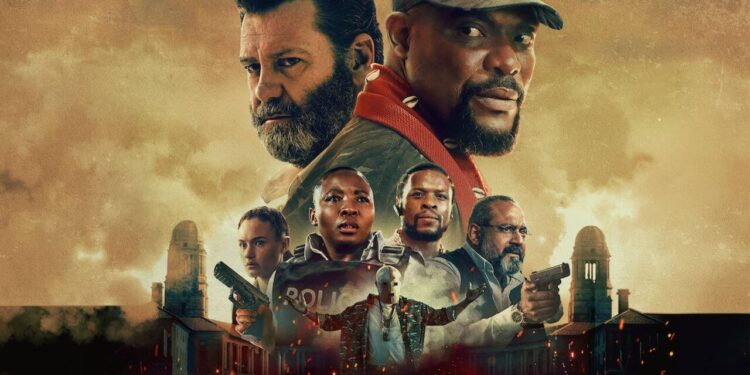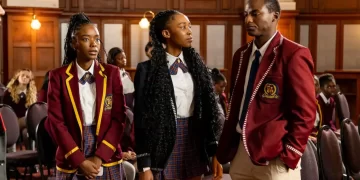From South Africa comes Justice Served, one of the best African series in recent times. It’s fresh, and it’s galvanising. It has a pulse that soothes you to adjust to its meter – four hours of unadulterated speculative entertainment. Justice Served has a lot of surprising nuance and depth. It’s surprising not because of the nuance but because audiences simply aren’t treated often enough to this level of gloss and polish. Because of that, even flaws appear as charming quirks to us.
The story centres around the trial of a white police officer who shot a black man in cold blood. A band of freedom fighters, a mysterious Illuminati-like militant fellowship known as the Namoor, take over the courthouse on the day of the trial and turn it into a live-streamed kangaroo court. They then conduct an online vote where ‘The People’ will decide the fate of Allan Harvey (Morné Visser, Trackers), the accused. Individual stories unfurl from this—sometimes, perhaps a little too individual. For instance, its use of the family or relation crutch between characters is over-deployed here. This character is the maid to that character who’s the boyfriend of this character who happens to be the daughter of… you get it. Somehow, it feels in poor taste, but as I said earlier, it seems like a peculiar quirk one may grow to find amusing. After all, nobody ever questioned The Bard, for example, for over-indulging in the same techniques.
Hlomla Dandala (The River) delivers a tour de force, playing Azania Maqoma, the commander of the Namoor, the Namoor being a word one simply has to hear uttered by the actor himself. His delivery is potent and grave, in tune with his idealist character. The central conflict in Justice Served is the dispute between Azania and his childhood freedom fighter chum, Abel, now a successful capitalist turncoat.
Throughout the six episodes, we’re treated to flashbacks spanning the 1980s to the previous year, set in all sorts of war zones in the continent. Very far back, the two characters are played by younger actors, who at one point are switched over to the principals, and it, thankfully, could be more apparent. We see them fighting in Rwanda, South Africa and other places, though one can’t help but ask, who exactly are they fighting? By the end of season one, their enemy remains vague and ethereal, some kind of amalgam of capitalism and white folk. What are they fighting for? ‘The People’, of course. Whoever they are. Without divulging too much, at the finale, Justice Served makes rather smart comments about that whole ‘The People’ business. The action scenes here are some of the best ever filmed in Africa.

One of Justice Served troubling qualities, though not necessarily a bad thing, is its preference for being entertainment rather than a veritable work of art or a statement, which it so clearly aspires to. It’s a tense situation – to thrill and sensationalise while at the same time speaking on social issues and, even more ambitiously, a whole society. Using thriller genre tropes to talk about those issues automatically cheapens them, forces them to fit into a box, and limits what can be done. This balance, this tense situation, is managed superbly by the show. Think of the image of the overburdened juggler, somehow making it all work. That’s Justice Served. It works, but for how much longer?
The cliffhangers for season one promise a very different show going forward. Granted, it’s pretty obvious early on what a second two of Justice Served will look like. The entire framework for the first season is set in the courthouse, the flashbacks, and the progressively slow and compelling character building in and out of the hostage situation. We could just as well call it a bottle season. Where the sophomore season is looking to pick up, it promises an expansion of that world and an even larger framework and scope. Season one had panache and style on its side, which we hope will not be lost if we get a second season.
That said, Justice Served has shocking deaths like anything on Game Of Thrones. The writing underlines some of its own big moments, leaving little room for subtlety, but with the type of show it is, it doesn’t feel as terrible as it usually does. You can almost hear its elevator pitch: imagine if the George Floyd trial was a bit more like OJ’s. What you get from an idea like that is first-rate television. God-awful title, though.
Justice Served is available to stream on Netflix.
Enjoyed this article?
To receive the latest updates from Sinema Focus directly to your inbox, subscribe now.











